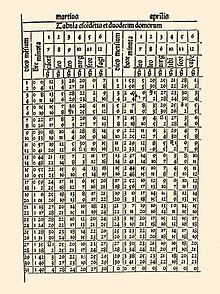Abraham Zacuto

Abraham Zacuto , also Zacuto of Salamanca or after the Portuguese spelling Abraão Zacuto , actually Abraham ben Shmuel Zacuth (* 1450 in Salamanca , Spain , † around 1510 in Damascus ) was a Sephardic astronomer who worked as a royal astronomer for King João II of Portugal worked.
Life
Zacuto was a professor at the University of Saragossa until the expulsion of the Jews from Spain in 1492 . He moved to Portugal and became a royal astronomer there. In 1496 the Jews were to celebrate the marriage of King Manuel I with the Spanish king's daughter also from Portugal marketed . Zacuto fled to Tunis . When persecution of the Jews broke out there, too , he emigrated to the Ottoman Empire .
The moon crater Zagut is named after him.
plant
He developed planet tables with which the positions of planets could be calculated in advance. His student José Vizinho translated it from Hebrew. His book "Almanach Perpetuum" was an important tool for seafaring; It is one of the first four books to be printed in Portugal using the Gutenberg method with movable metal letters .
Christopher Columbus , who was in close contact with Zacuto and Vizinho, used one copy for life.
Zacuto was rabbi of his community and wrote Sefer Hayuhasin in Tunis in 1504 , a history of Judaism from creation to 1500.
Web links
- Biography of Abraão Zacuto ( Memento from December 15, 2007 in the Internet Archive ) (Portuguese) of the Portuguese cultural institute Instituto Camões
- Works by Abraham Zacuto in the complete catalog of incandescent prints
- Gallery of Our Great: Rabbi Abraham Zacuto
- Science in Portugal (English)
- A Timeline of Jewish Texts, How did the different genres of Jewish texts develop chronologically? His text "Sefer haYuhasin" classified
- About his family ties
Individual evidence
- ↑ a b Berthold Cohn (1918): The Almanach perpetuum des Abraham Zacuto; a contribution to the history of astronomy in the Middle Ages , p. 3 ( online )
| personal data | |
|---|---|
| SURNAME | Zacuto, Abraham |
| ALTERNATIVE NAMES | Zacuth, Abraham ben Shmuel |
| BRIEF DESCRIPTION | Sephardic astronomer |
| DATE OF BIRTH | 1450 |
| PLACE OF BIRTH | Salamanca , Spain |
| DATE OF DEATH | around 1510 |
| Place of death | Damascus |
